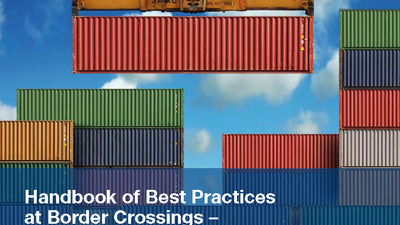-
Our work
-
Fields of work
- Arms control
- Border management
- Combating trafficking in human beings
- Conflict prevention and resolution
- Countering terrorism
- Cyber/ICT Security
- Democratization
- Economic activities
- Education
- Elections
- Environmental activities
- Gender equality
- Good governance
- Human rights
- Media freedom and development
- Migration
- National minority issues
- Policing
- Reform and co-operation in the security sector
- Roma and Sinti
- Rule of law
- Tolerance and non-discrimination
- Youth
- Field operations
- Projects
-
Meetings and conferences
- Summit meetings
- Review Conferences
- Ministerial Council meetings
- Plenary meetings of the Permanent Council
- Plenary Meetings of the Forum for Security Co-operation
- Security Review Conferences
- Annual Implementation Assessment Meetings
- Economic and Environmental Forum
- Economic and Environmental Dimension Implementation Meetings
- Human rights meetings
- Media conferences
- Cyber/ICT security conferences
- Conference of the Alliance against Trafficking in Persons
- Gender equality conferences
- Annual OSCE Mediterranean conferences
- Annual OSCE Asian conferences
- Partnerships
-
Fields of work
-
Countries
- All
-
Participating States
- Albania
- Andorra
- Armenia
- Austria
- Azerbaijan
- Belgium
- Belarus
- Bosnia and Herzegovina
- Bulgaria
- Canada
- Croatia
- Cyprus
- Czechia
- Denmark
- Estonia
- Finland
- France
- Georgia
- Germany
- Greece
- Holy See
- Hungary
- Iceland
- Ireland
- Italy
- Kazakhstan
- Kyrgyzstan
- Latvia
- Liechtenstein
- Lithuania
- Luxembourg
- Malta
- Moldova
- Monaco
- Mongolia
- Montenegro
- The Netherlands
- North Macedonia
- Norway
- Poland
- Portugal
- Romania
- Russian Federation
- San Marino
- Serbia
- Slovakia
- Slovenia
- Spain
- Sweden
- Switzerland – OSCE Chairpersonship 2026
- Tajikistan
- Türkiye
- Turkmenistan
- Ukraine
- United Kingdom
- United States of America
- Uzbekistan
- Asian Partners for Co-operation
- Mediterranean Partners for Co-operation
-
Structures and institutions
- Chairpersonship
-
Secretariat
- Secretary General
- Office of the Secretary General
- Conflict Prevention Centre
- Transnational Threats Department
- Office of the Special Representative and Co-ordinator for Combating Trafficking in Human Beings
- Office of the Co-ordinator of OSCE Economic and Environmental Activities
- Gender Issues Programme
- Opportunities for Youth
- Department of Human Resources
- Department of Management and Finance
- Office of Internal Oversight
- Documentation Centre in Prague
- Institutions
-
Field operations
- Presence in Albania
- Centre in Ashgabat
- Programme Office in Astana
- Programme Office in Bishkek
- Mission to Bosnia and Herzegovina
- Programme Office in Dushanbe
- Mission in Kosovo
- Mission to Moldova
- Mission to Montenegro
- Mission to Serbia
- Mission to Skopje
- Project Co-ordinator in Uzbekistan
- Closed field activities
- Parliamentary Assembly
- Court of Conciliation and Arbitration
- Organizational structure
- About us
News Item
OSCE holds trade and transport workshop with Black Sea Economic Cooperation
The Office of the Co-ordinator of OSCE Economic and Environmental Activities, jointly with the Secretariat of the Black Sea Economic Cooperation (BSEC), held a workshop on 3 April 2013 in Istanbul on border and customs issues...

- Issued on:
- Issued by:
- OSCE Secretariat
- Fields of work:
- Economic activities
The Office of the Co-ordinator of OSCE Economic and Environmental Activities, jointly with the Secretariat of the Black Sea Economic Cooperation (BSEC), held a workshop on 3 April 2013 in Istanbul on border and customs issues.
The workshop focused on topics covered in the OSCE-UNECE Handbook of Best Practice at Border Crossings – A Trade and Transport Facilitation Perspective and gathered more than 50 senior customs officials and consular staff from BSEC Member States (all of which are OSCE participating States) as well as from Mediterranean Partner for Co-operation Egypt.
Participants agreed on the importance of more effective implementation of international legal conventions, tools and standards, including the World Customs Organization’s Revised Kyoto Convention and the UN Economic Commission for Europe’s International Convention on the Harmonization of Frontier Controls of Goods. In that context, BSEC members who have not yet ratified these legal instruments were urged to step up their efforts in doing so.
The need to increase inter-agency co-operation among customs and border agencies at the national level as well as find a better balance between security and trade facilitation and 'adopt a risk-based approach in customs controls' were emphasized. Participants also learned about the opportunities offered by public private partnerships in border management, which can enable governments and the private sector to share contributions and benefits of modernizing infrastructure and procedures.
The OSCE-UNECE Handbook provides an overview of tools and methodologies that can be used to harmonize and simplify existing procedures for legitimate cargo, as well as recommendations to improve inter-agency co-operation. Through case studies and practical examples, it also provides an opportunity for various countries to learn from each other’s experiences. It is available in English and Russian at //www.osce.org/eea/88200 and http://www.unece.org/trans/publications/wp30/best_practices.html, and will soon be made available in Albanian, Macedonian and Serbian languages.
Read more on this topic
The OSCE bears no responsibility for the accuracy, legality or content of the external links provided.